SNPG962: Self-Assessment Report on Clinical Judgement Skills
VerifiedAdded on 2023/03/31
|10
|1956
|355
Report
AI Summary
This self-assessment report reflects on a nursing student's development of clinical judgment and reasoning skills, focusing on the challenges and improvements encountered throughout the semester. The student explores the importance of clinical judgment in patient care, highlighting the need for effective decision-making, especially in acute care scenarios. The report discusses the student's personal development, including the recognition of the importance of self-regulation skills in managing emotions during critical situations and the adoption of therapies to improve these skills. Furthermore, the student identifies the need for enhanced communication skills to improve patient interaction and ensure effective care planning. The report concludes with a reflection on the learning experience, emphasizing the importance of clinical skills, self-regulation, and communication in providing quality patient care. The student also includes the references used for the report.
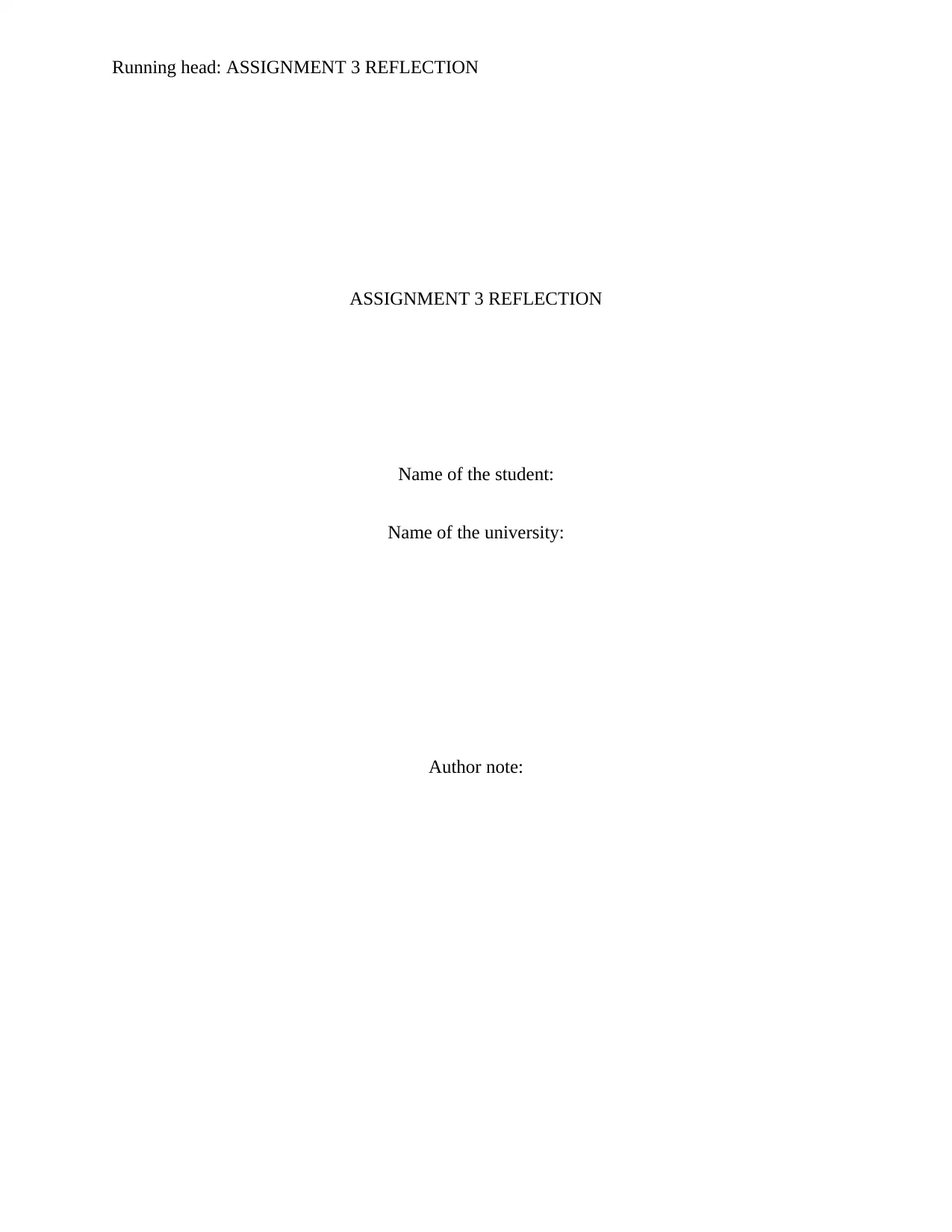
Running head: ASSIGNMENT 3 REFLECTION
ASSIGNMENT 3 REFLECTION
Name of the student:
Name of the university:
Author note:
ASSIGNMENT 3 REFLECTION
Name of the student:
Name of the university:
Author note:
Paraphrase This Document
Need a fresh take? Get an instant paraphrase of this document with our AI Paraphraser
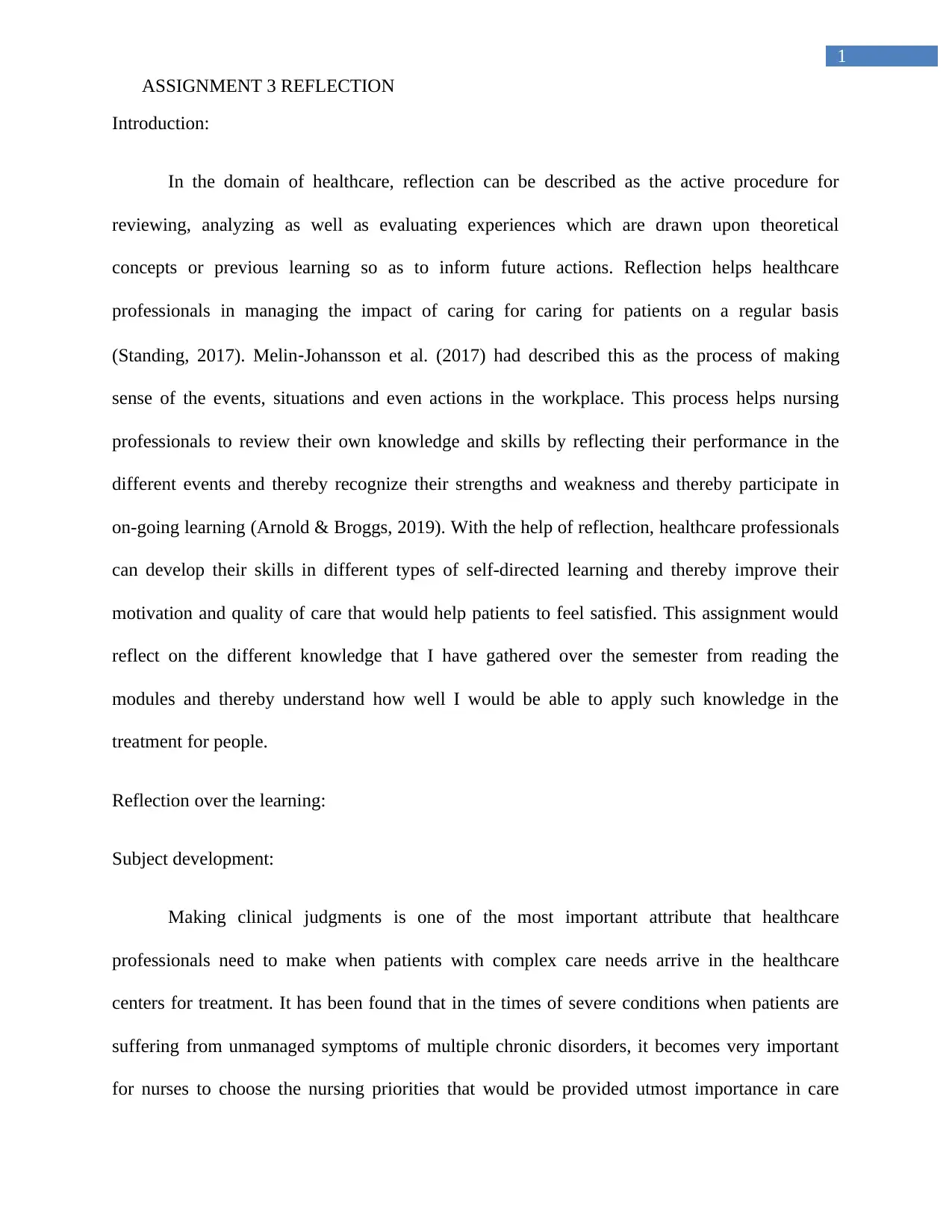
1
ASSIGNMENT 3 REFLECTION
Introduction:
In the domain of healthcare, reflection can be described as the active procedure for
reviewing, analyzing as well as evaluating experiences which are drawn upon theoretical
concepts or previous learning so as to inform future actions. Reflection helps healthcare
professionals in managing the impact of caring for caring for patients on a regular basis
(Standing, 2017). Melin‐Johansson et al. (2017) had described this as the process of making
sense of the events, situations and even actions in the workplace. This process helps nursing
professionals to review their own knowledge and skills by reflecting their performance in the
different events and thereby recognize their strengths and weakness and thereby participate in
on-going learning (Arnold & Broggs, 2019). With the help of reflection, healthcare professionals
can develop their skills in different types of self-directed learning and thereby improve their
motivation and quality of care that would help patients to feel satisfied. This assignment would
reflect on the different knowledge that I have gathered over the semester from reading the
modules and thereby understand how well I would be able to apply such knowledge in the
treatment for people.
Reflection over the learning:
Subject development:
Making clinical judgments is one of the most important attribute that healthcare
professionals need to make when patients with complex care needs arrive in the healthcare
centers for treatment. It has been found that in the times of severe conditions when patients are
suffering from unmanaged symptoms of multiple chronic disorders, it becomes very important
for nurses to choose the nursing priorities that would be provided utmost importance in care
ASSIGNMENT 3 REFLECTION
Introduction:
In the domain of healthcare, reflection can be described as the active procedure for
reviewing, analyzing as well as evaluating experiences which are drawn upon theoretical
concepts or previous learning so as to inform future actions. Reflection helps healthcare
professionals in managing the impact of caring for caring for patients on a regular basis
(Standing, 2017). Melin‐Johansson et al. (2017) had described this as the process of making
sense of the events, situations and even actions in the workplace. This process helps nursing
professionals to review their own knowledge and skills by reflecting their performance in the
different events and thereby recognize their strengths and weakness and thereby participate in
on-going learning (Arnold & Broggs, 2019). With the help of reflection, healthcare professionals
can develop their skills in different types of self-directed learning and thereby improve their
motivation and quality of care that would help patients to feel satisfied. This assignment would
reflect on the different knowledge that I have gathered over the semester from reading the
modules and thereby understand how well I would be able to apply such knowledge in the
treatment for people.
Reflection over the learning:
Subject development:
Making clinical judgments is one of the most important attribute that healthcare
professionals need to make when patients with complex care needs arrive in the healthcare
centers for treatment. It has been found that in the times of severe conditions when patients are
suffering from unmanaged symptoms of multiple chronic disorders, it becomes very important
for nurses to choose the nursing priorities that would be provided utmost importance in care
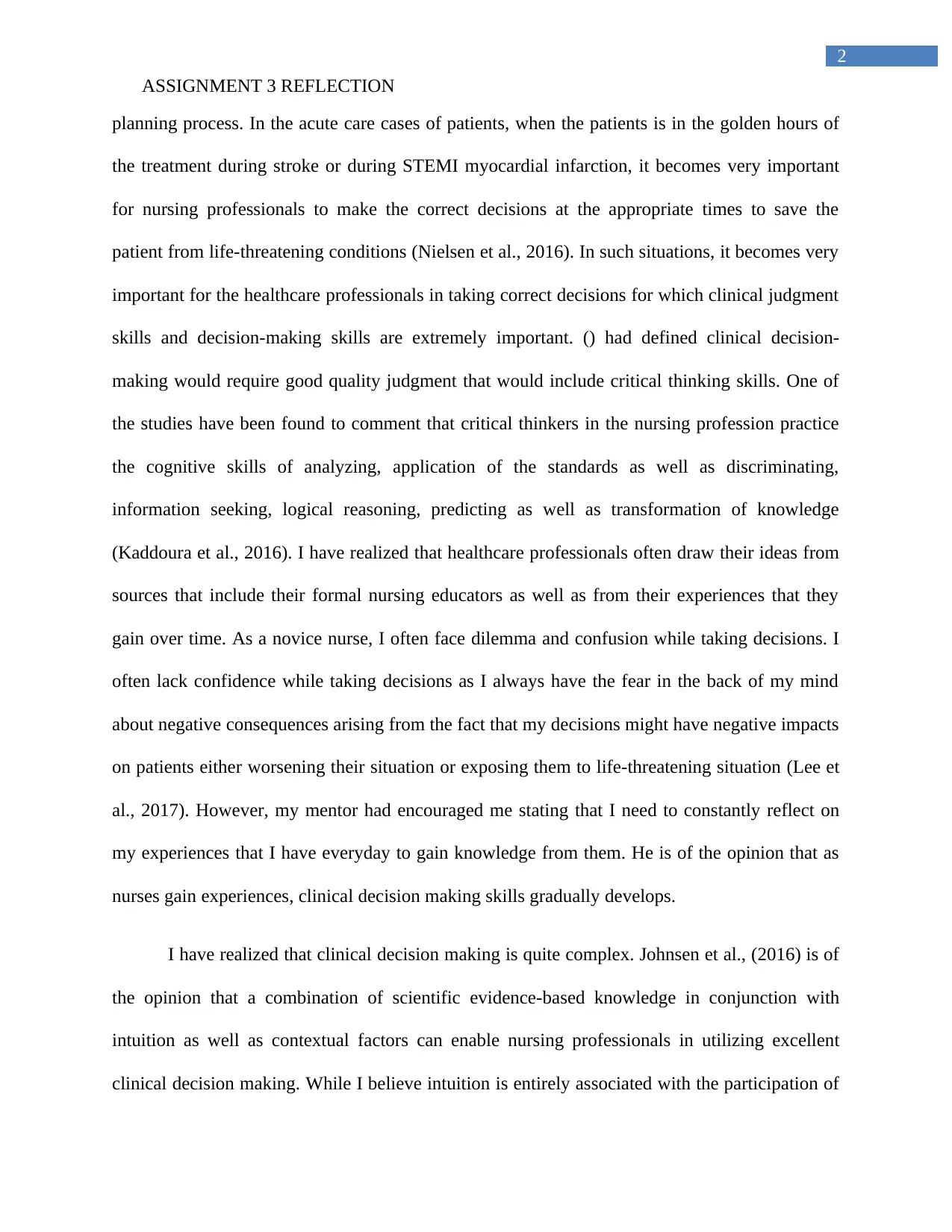
2
ASSIGNMENT 3 REFLECTION
planning process. In the acute care cases of patients, when the patients is in the golden hours of
the treatment during stroke or during STEMI myocardial infarction, it becomes very important
for nursing professionals to make the correct decisions at the appropriate times to save the
patient from life-threatening conditions (Nielsen et al., 2016). In such situations, it becomes very
important for the healthcare professionals in taking correct decisions for which clinical judgment
skills and decision-making skills are extremely important. () had defined clinical decision-
making would require good quality judgment that would include critical thinking skills. One of
the studies have been found to comment that critical thinkers in the nursing profession practice
the cognitive skills of analyzing, application of the standards as well as discriminating,
information seeking, logical reasoning, predicting as well as transformation of knowledge
(Kaddoura et al., 2016). I have realized that healthcare professionals often draw their ideas from
sources that include their formal nursing educators as well as from their experiences that they
gain over time. As a novice nurse, I often face dilemma and confusion while taking decisions. I
often lack confidence while taking decisions as I always have the fear in the back of my mind
about negative consequences arising from the fact that my decisions might have negative impacts
on patients either worsening their situation or exposing them to life-threatening situation (Lee et
al., 2017). However, my mentor had encouraged me stating that I need to constantly reflect on
my experiences that I have everyday to gain knowledge from them. He is of the opinion that as
nurses gain experiences, clinical decision making skills gradually develops.
I have realized that clinical decision making is quite complex. Johnsen et al., (2016) is of
the opinion that a combination of scientific evidence-based knowledge in conjunction with
intuition as well as contextual factors can enable nursing professionals in utilizing excellent
clinical decision making. While I believe intuition is entirely associated with the participation of
ASSIGNMENT 3 REFLECTION
planning process. In the acute care cases of patients, when the patients is in the golden hours of
the treatment during stroke or during STEMI myocardial infarction, it becomes very important
for nursing professionals to make the correct decisions at the appropriate times to save the
patient from life-threatening conditions (Nielsen et al., 2016). In such situations, it becomes very
important for the healthcare professionals in taking correct decisions for which clinical judgment
skills and decision-making skills are extremely important. () had defined clinical decision-
making would require good quality judgment that would include critical thinking skills. One of
the studies have been found to comment that critical thinkers in the nursing profession practice
the cognitive skills of analyzing, application of the standards as well as discriminating,
information seeking, logical reasoning, predicting as well as transformation of knowledge
(Kaddoura et al., 2016). I have realized that healthcare professionals often draw their ideas from
sources that include their formal nursing educators as well as from their experiences that they
gain over time. As a novice nurse, I often face dilemma and confusion while taking decisions. I
often lack confidence while taking decisions as I always have the fear in the back of my mind
about negative consequences arising from the fact that my decisions might have negative impacts
on patients either worsening their situation or exposing them to life-threatening situation (Lee et
al., 2017). However, my mentor had encouraged me stating that I need to constantly reflect on
my experiences that I have everyday to gain knowledge from them. He is of the opinion that as
nurses gain experiences, clinical decision making skills gradually develops.
I have realized that clinical decision making is quite complex. Johnsen et al., (2016) is of
the opinion that a combination of scientific evidence-based knowledge in conjunction with
intuition as well as contextual factors can enable nursing professionals in utilizing excellent
clinical decision making. While I believe intuition is entirely associated with the participation of
⊘ This is a preview!⊘
Do you want full access?
Subscribe today to unlock all pages.

Trusted by 1+ million students worldwide
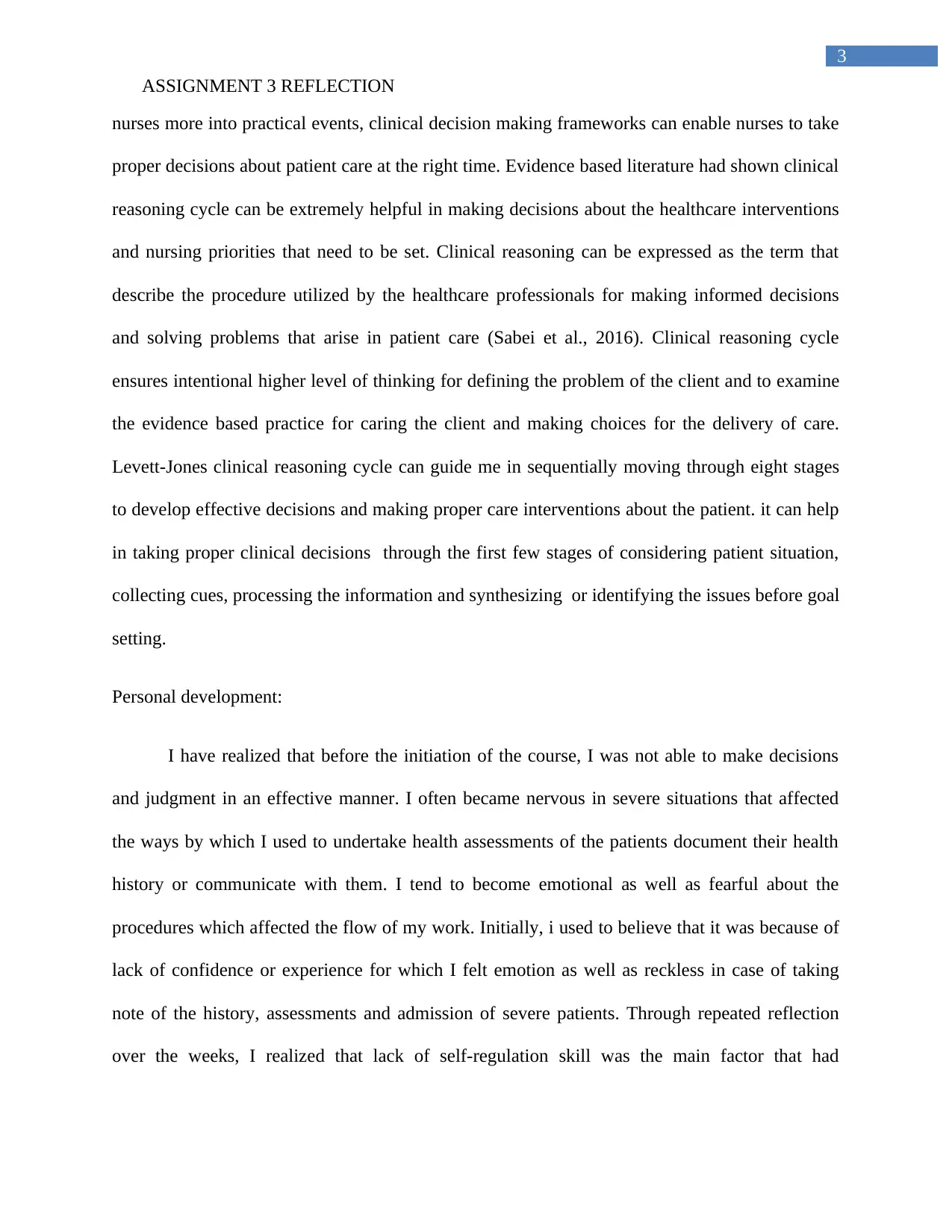
3
ASSIGNMENT 3 REFLECTION
nurses more into practical events, clinical decision making frameworks can enable nurses to take
proper decisions about patient care at the right time. Evidence based literature had shown clinical
reasoning cycle can be extremely helpful in making decisions about the healthcare interventions
and nursing priorities that need to be set. Clinical reasoning can be expressed as the term that
describe the procedure utilized by the healthcare professionals for making informed decisions
and solving problems that arise in patient care (Sabei et al., 2016). Clinical reasoning cycle
ensures intentional higher level of thinking for defining the problem of the client and to examine
the evidence based practice for caring the client and making choices for the delivery of care.
Levett-Jones clinical reasoning cycle can guide me in sequentially moving through eight stages
to develop effective decisions and making proper care interventions about the patient. it can help
in taking proper clinical decisions through the first few stages of considering patient situation,
collecting cues, processing the information and synthesizing or identifying the issues before goal
setting.
Personal development:
I have realized that before the initiation of the course, I was not able to make decisions
and judgment in an effective manner. I often became nervous in severe situations that affected
the ways by which I used to undertake health assessments of the patients document their health
history or communicate with them. I tend to become emotional as well as fearful about the
procedures which affected the flow of my work. Initially, i used to believe that it was because of
lack of confidence or experience for which I felt emotion as well as reckless in case of taking
note of the history, assessments and admission of severe patients. Through repeated reflection
over the weeks, I realized that lack of self-regulation skill was the main factor that had
ASSIGNMENT 3 REFLECTION
nurses more into practical events, clinical decision making frameworks can enable nurses to take
proper decisions about patient care at the right time. Evidence based literature had shown clinical
reasoning cycle can be extremely helpful in making decisions about the healthcare interventions
and nursing priorities that need to be set. Clinical reasoning can be expressed as the term that
describe the procedure utilized by the healthcare professionals for making informed decisions
and solving problems that arise in patient care (Sabei et al., 2016). Clinical reasoning cycle
ensures intentional higher level of thinking for defining the problem of the client and to examine
the evidence based practice for caring the client and making choices for the delivery of care.
Levett-Jones clinical reasoning cycle can guide me in sequentially moving through eight stages
to develop effective decisions and making proper care interventions about the patient. it can help
in taking proper clinical decisions through the first few stages of considering patient situation,
collecting cues, processing the information and synthesizing or identifying the issues before goal
setting.
Personal development:
I have realized that before the initiation of the course, I was not able to make decisions
and judgment in an effective manner. I often became nervous in severe situations that affected
the ways by which I used to undertake health assessments of the patients document their health
history or communicate with them. I tend to become emotional as well as fearful about the
procedures which affected the flow of my work. Initially, i used to believe that it was because of
lack of confidence or experience for which I felt emotion as well as reckless in case of taking
note of the history, assessments and admission of severe patients. Through repeated reflection
over the weeks, I realized that lack of self-regulation skill was the main factor that had
Paraphrase This Document
Need a fresh take? Get an instant paraphrase of this document with our AI Paraphraser
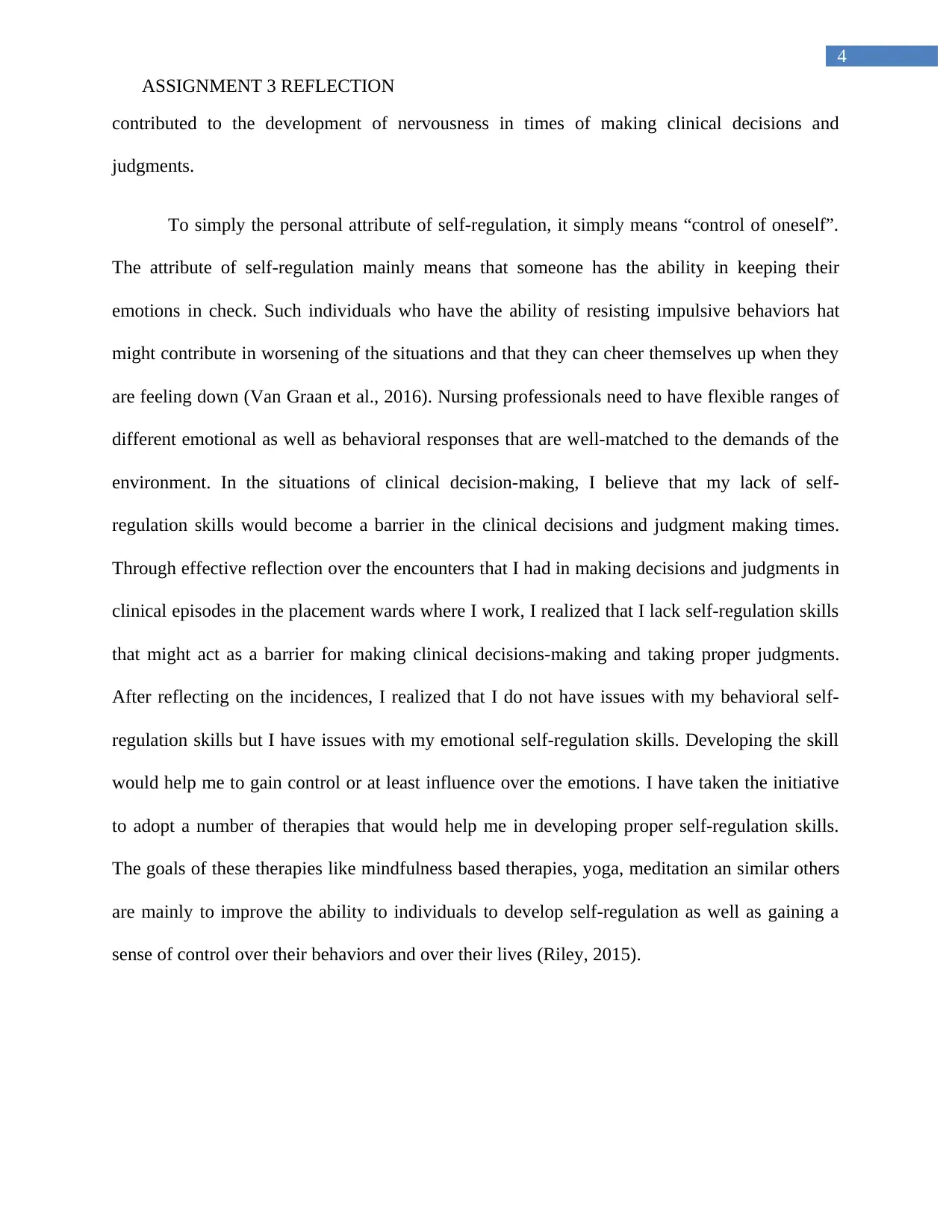
4
ASSIGNMENT 3 REFLECTION
contributed to the development of nervousness in times of making clinical decisions and
judgments.
To simply the personal attribute of self-regulation, it simply means “control of oneself”.
The attribute of self-regulation mainly means that someone has the ability in keeping their
emotions in check. Such individuals who have the ability of resisting impulsive behaviors hat
might contribute in worsening of the situations and that they can cheer themselves up when they
are feeling down (Van Graan et al., 2016). Nursing professionals need to have flexible ranges of
different emotional as well as behavioral responses that are well-matched to the demands of the
environment. In the situations of clinical decision-making, I believe that my lack of self-
regulation skills would become a barrier in the clinical decisions and judgment making times.
Through effective reflection over the encounters that I had in making decisions and judgments in
clinical episodes in the placement wards where I work, I realized that I lack self-regulation skills
that might act as a barrier for making clinical decisions-making and taking proper judgments.
After reflecting on the incidences, I realized that I do not have issues with my behavioral self-
regulation skills but I have issues with my emotional self-regulation skills. Developing the skill
would help me to gain control or at least influence over the emotions. I have taken the initiative
to adopt a number of therapies that would help me in developing proper self-regulation skills.
The goals of these therapies like mindfulness based therapies, yoga, meditation an similar others
are mainly to improve the ability to individuals to develop self-regulation as well as gaining a
sense of control over their behaviors and over their lives (Riley, 2015).
ASSIGNMENT 3 REFLECTION
contributed to the development of nervousness in times of making clinical decisions and
judgments.
To simply the personal attribute of self-regulation, it simply means “control of oneself”.
The attribute of self-regulation mainly means that someone has the ability in keeping their
emotions in check. Such individuals who have the ability of resisting impulsive behaviors hat
might contribute in worsening of the situations and that they can cheer themselves up when they
are feeling down (Van Graan et al., 2016). Nursing professionals need to have flexible ranges of
different emotional as well as behavioral responses that are well-matched to the demands of the
environment. In the situations of clinical decision-making, I believe that my lack of self-
regulation skills would become a barrier in the clinical decisions and judgment making times.
Through effective reflection over the encounters that I had in making decisions and judgments in
clinical episodes in the placement wards where I work, I realized that I lack self-regulation skills
that might act as a barrier for making clinical decisions-making and taking proper judgments.
After reflecting on the incidences, I realized that I do not have issues with my behavioral self-
regulation skills but I have issues with my emotional self-regulation skills. Developing the skill
would help me to gain control or at least influence over the emotions. I have taken the initiative
to adopt a number of therapies that would help me in developing proper self-regulation skills.
The goals of these therapies like mindfulness based therapies, yoga, meditation an similar others
are mainly to improve the ability to individuals to develop self-regulation as well as gaining a
sense of control over their behaviors and over their lives (Riley, 2015).
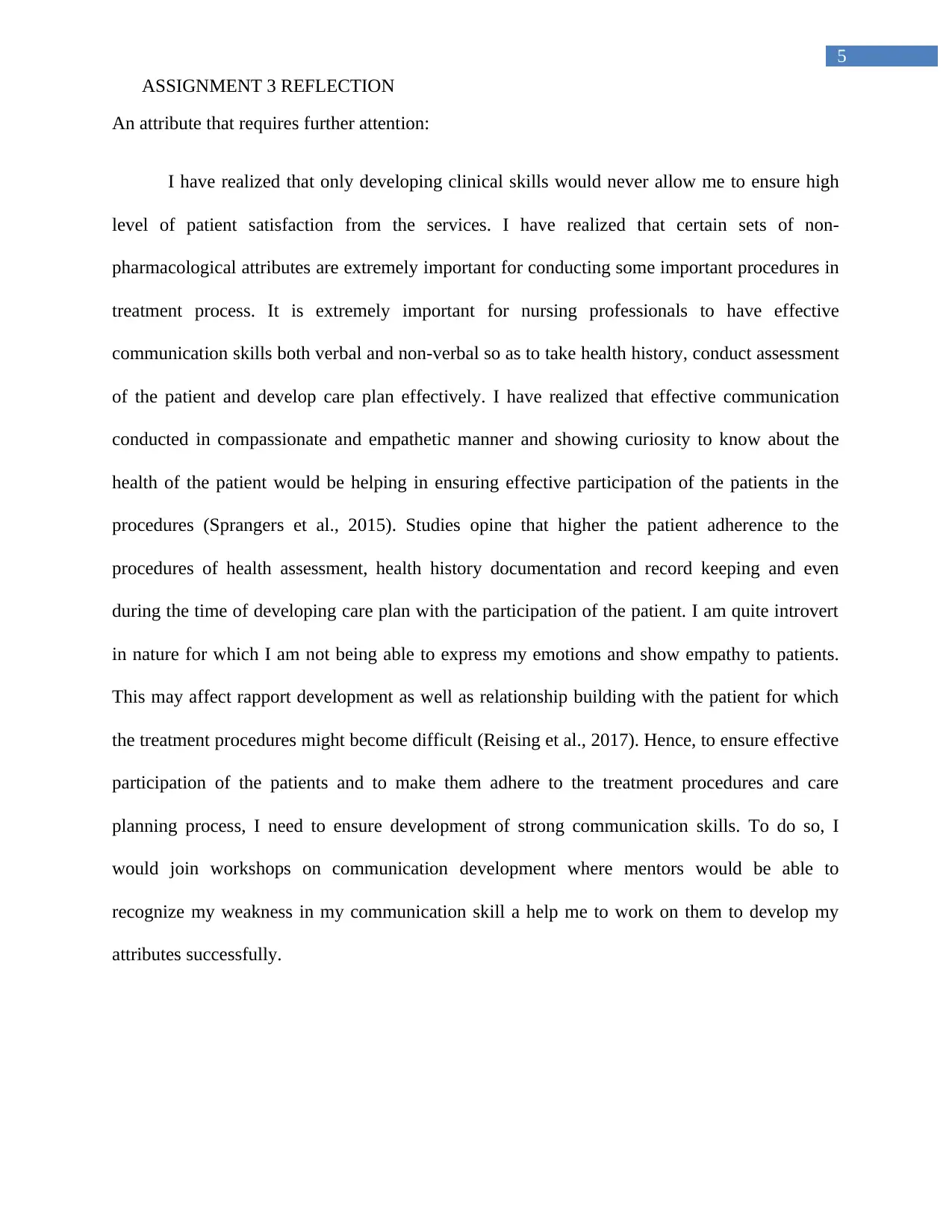
5
ASSIGNMENT 3 REFLECTION
An attribute that requires further attention:
I have realized that only developing clinical skills would never allow me to ensure high
level of patient satisfaction from the services. I have realized that certain sets of non-
pharmacological attributes are extremely important for conducting some important procedures in
treatment process. It is extremely important for nursing professionals to have effective
communication skills both verbal and non-verbal so as to take health history, conduct assessment
of the patient and develop care plan effectively. I have realized that effective communication
conducted in compassionate and empathetic manner and showing curiosity to know about the
health of the patient would be helping in ensuring effective participation of the patients in the
procedures (Sprangers et al., 2015). Studies opine that higher the patient adherence to the
procedures of health assessment, health history documentation and record keeping and even
during the time of developing care plan with the participation of the patient. I am quite introvert
in nature for which I am not being able to express my emotions and show empathy to patients.
This may affect rapport development as well as relationship building with the patient for which
the treatment procedures might become difficult (Reising et al., 2017). Hence, to ensure effective
participation of the patients and to make them adhere to the treatment procedures and care
planning process, I need to ensure development of strong communication skills. To do so, I
would join workshops on communication development where mentors would be able to
recognize my weakness in my communication skill a help me to work on them to develop my
attributes successfully.
ASSIGNMENT 3 REFLECTION
An attribute that requires further attention:
I have realized that only developing clinical skills would never allow me to ensure high
level of patient satisfaction from the services. I have realized that certain sets of non-
pharmacological attributes are extremely important for conducting some important procedures in
treatment process. It is extremely important for nursing professionals to have effective
communication skills both verbal and non-verbal so as to take health history, conduct assessment
of the patient and develop care plan effectively. I have realized that effective communication
conducted in compassionate and empathetic manner and showing curiosity to know about the
health of the patient would be helping in ensuring effective participation of the patients in the
procedures (Sprangers et al., 2015). Studies opine that higher the patient adherence to the
procedures of health assessment, health history documentation and record keeping and even
during the time of developing care plan with the participation of the patient. I am quite introvert
in nature for which I am not being able to express my emotions and show empathy to patients.
This may affect rapport development as well as relationship building with the patient for which
the treatment procedures might become difficult (Reising et al., 2017). Hence, to ensure effective
participation of the patients and to make them adhere to the treatment procedures and care
planning process, I need to ensure development of strong communication skills. To do so, I
would join workshops on communication development where mentors would be able to
recognize my weakness in my communication skill a help me to work on them to develop my
attributes successfully.
⊘ This is a preview!⊘
Do you want full access?
Subscribe today to unlock all pages.

Trusted by 1+ million students worldwide
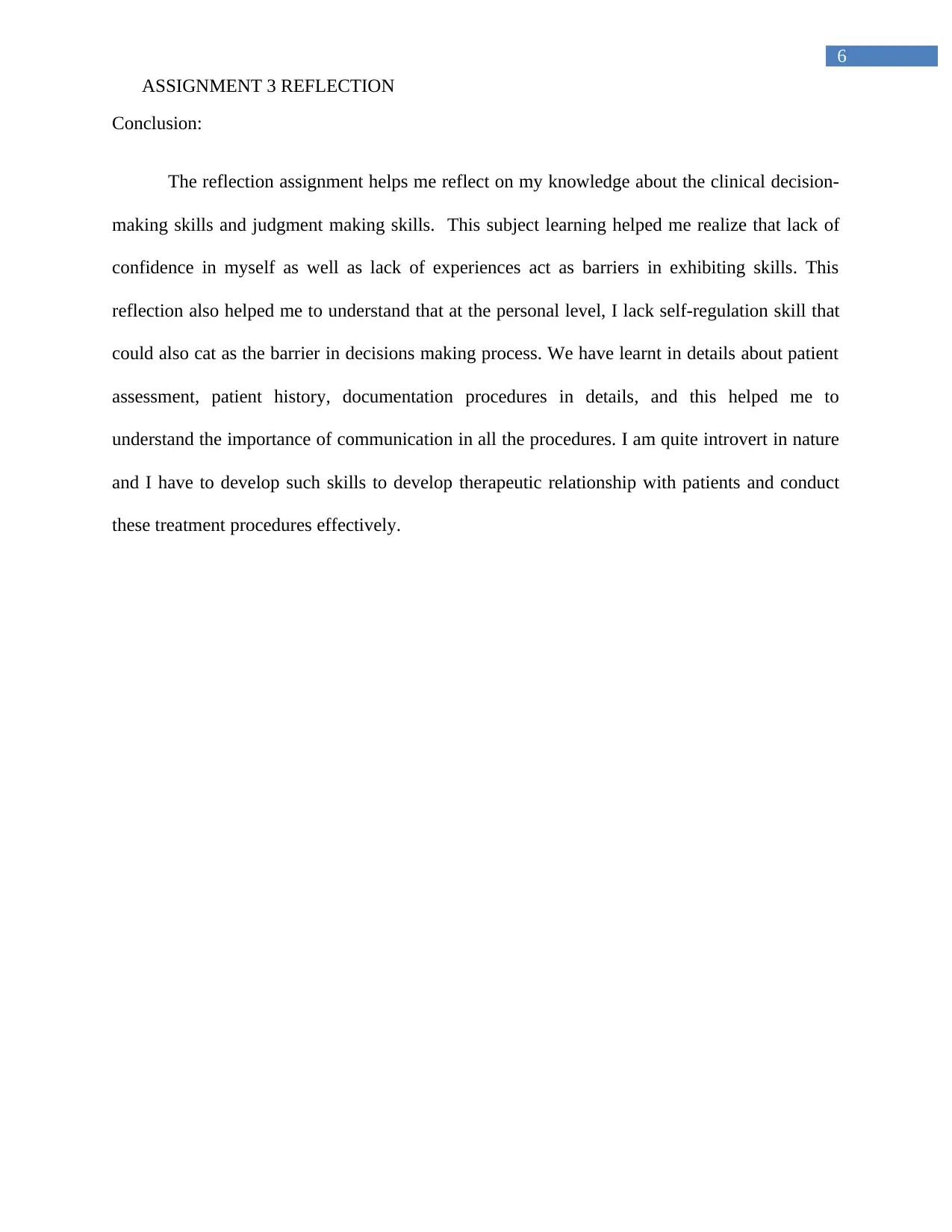
6
ASSIGNMENT 3 REFLECTION
Conclusion:
The reflection assignment helps me reflect on my knowledge about the clinical decision-
making skills and judgment making skills. This subject learning helped me realize that lack of
confidence in myself as well as lack of experiences act as barriers in exhibiting skills. This
reflection also helped me to understand that at the personal level, I lack self-regulation skill that
could also cat as the barrier in decisions making process. We have learnt in details about patient
assessment, patient history, documentation procedures in details, and this helped me to
understand the importance of communication in all the procedures. I am quite introvert in nature
and I have to develop such skills to develop therapeutic relationship with patients and conduct
these treatment procedures effectively.
ASSIGNMENT 3 REFLECTION
Conclusion:
The reflection assignment helps me reflect on my knowledge about the clinical decision-
making skills and judgment making skills. This subject learning helped me realize that lack of
confidence in myself as well as lack of experiences act as barriers in exhibiting skills. This
reflection also helped me to understand that at the personal level, I lack self-regulation skill that
could also cat as the barrier in decisions making process. We have learnt in details about patient
assessment, patient history, documentation procedures in details, and this helped me to
understand the importance of communication in all the procedures. I am quite introvert in nature
and I have to develop such skills to develop therapeutic relationship with patients and conduct
these treatment procedures effectively.
Paraphrase This Document
Need a fresh take? Get an instant paraphrase of this document with our AI Paraphraser
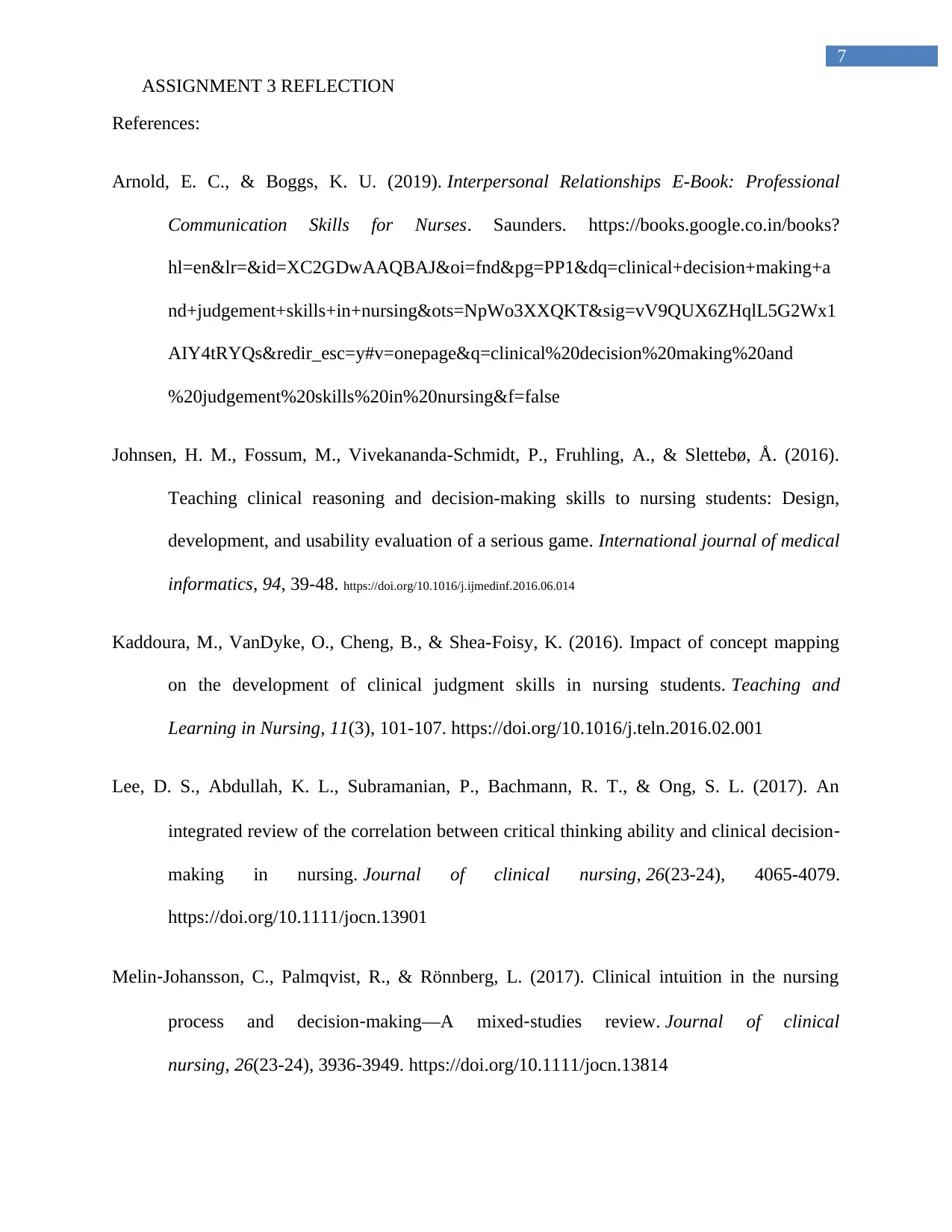
7
ASSIGNMENT 3 REFLECTION
References:
Arnold, E. C., & Boggs, K. U. (2019). Interpersonal Relationships E-Book: Professional
Communication Skills for Nurses. Saunders. https://books.google.co.in/books?
hl=en&lr=&id=XC2GDwAAQBAJ&oi=fnd&pg=PP1&dq=clinical+decision+making+a
nd+judgement+skills+in+nursing&ots=NpWo3XXQKT&sig=vV9QUX6ZHqlL5G2Wx1
AIY4tRYQs&redir_esc=y#v=onepage&q=clinical%20decision%20making%20and
%20judgement%20skills%20in%20nursing&f=false
Johnsen, H. M., Fossum, M., Vivekananda-Schmidt, P., Fruhling, A., & Slettebø, Å. (2016).
Teaching clinical reasoning and decision-making skills to nursing students: Design,
development, and usability evaluation of a serious game. International journal of medical
informatics, 94, 39-48. https://doi.org/10.1016/j.ijmedinf.2016.06.014
Kaddoura, M., VanDyke, O., Cheng, B., & Shea-Foisy, K. (2016). Impact of concept mapping
on the development of clinical judgment skills in nursing students. Teaching and
Learning in Nursing, 11(3), 101-107. https://doi.org/10.1016/j.teln.2016.02.001
Lee, D. S., Abdullah, K. L., Subramanian, P., Bachmann, R. T., & Ong, S. L. (2017). An
integrated review of the correlation between critical thinking ability and clinical decision‐
making in nursing. Journal of clinical nursing, 26(23-24), 4065-4079.
https://doi.org/10.1111/jocn.13901
Melin‐Johansson, C., Palmqvist, R., & Rönnberg, L. (2017). Clinical intuition in the nursing
process and decision‐making—A mixed‐studies review. Journal of clinical
nursing, 26(23-24), 3936-3949. https://doi.org/10.1111/jocn.13814
ASSIGNMENT 3 REFLECTION
References:
Arnold, E. C., & Boggs, K. U. (2019). Interpersonal Relationships E-Book: Professional
Communication Skills for Nurses. Saunders. https://books.google.co.in/books?
hl=en&lr=&id=XC2GDwAAQBAJ&oi=fnd&pg=PP1&dq=clinical+decision+making+a
nd+judgement+skills+in+nursing&ots=NpWo3XXQKT&sig=vV9QUX6ZHqlL5G2Wx1
AIY4tRYQs&redir_esc=y#v=onepage&q=clinical%20decision%20making%20and
%20judgement%20skills%20in%20nursing&f=false
Johnsen, H. M., Fossum, M., Vivekananda-Schmidt, P., Fruhling, A., & Slettebø, Å. (2016).
Teaching clinical reasoning and decision-making skills to nursing students: Design,
development, and usability evaluation of a serious game. International journal of medical
informatics, 94, 39-48. https://doi.org/10.1016/j.ijmedinf.2016.06.014
Kaddoura, M., VanDyke, O., Cheng, B., & Shea-Foisy, K. (2016). Impact of concept mapping
on the development of clinical judgment skills in nursing students. Teaching and
Learning in Nursing, 11(3), 101-107. https://doi.org/10.1016/j.teln.2016.02.001
Lee, D. S., Abdullah, K. L., Subramanian, P., Bachmann, R. T., & Ong, S. L. (2017). An
integrated review of the correlation between critical thinking ability and clinical decision‐
making in nursing. Journal of clinical nursing, 26(23-24), 4065-4079.
https://doi.org/10.1111/jocn.13901
Melin‐Johansson, C., Palmqvist, R., & Rönnberg, L. (2017). Clinical intuition in the nursing
process and decision‐making—A mixed‐studies review. Journal of clinical
nursing, 26(23-24), 3936-3949. https://doi.org/10.1111/jocn.13814
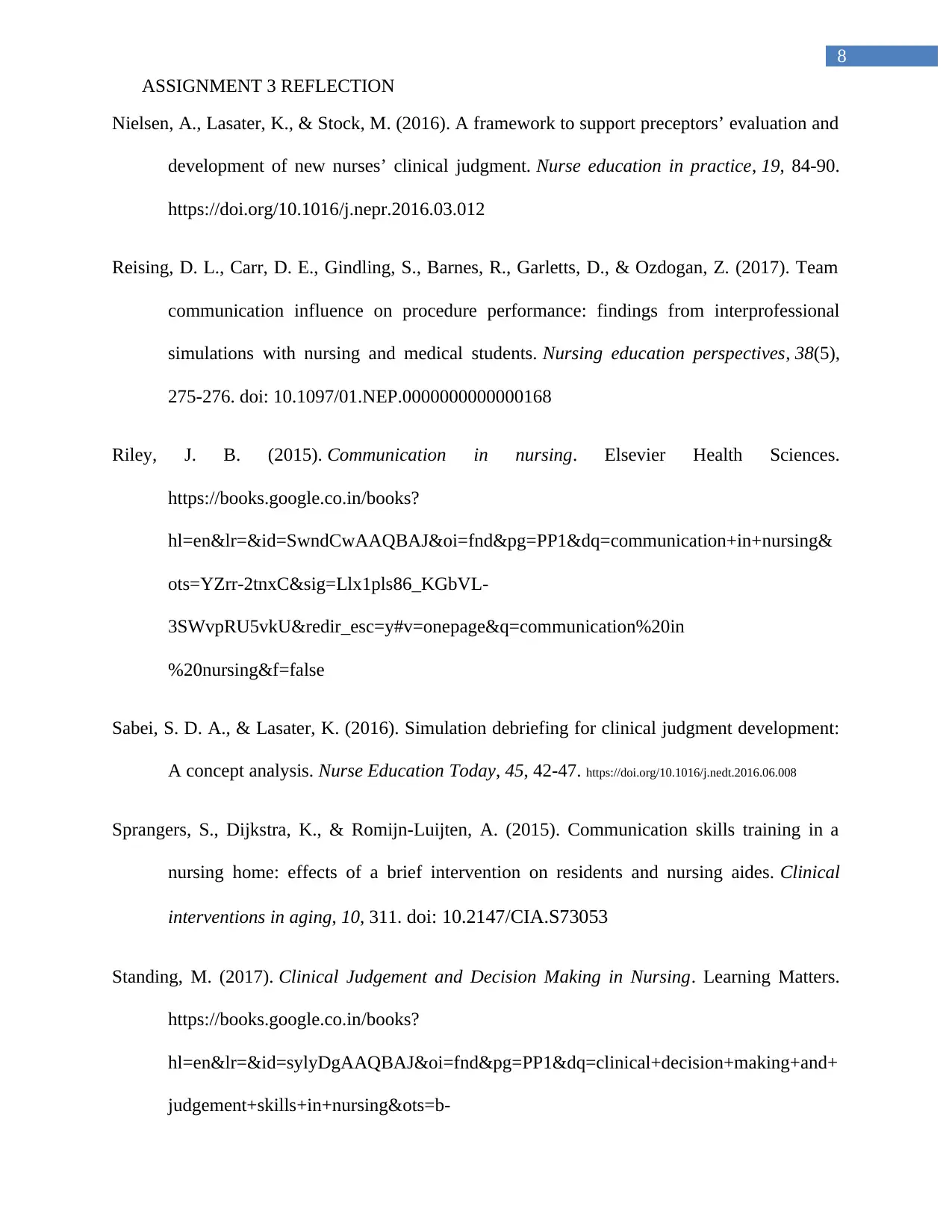
8
ASSIGNMENT 3 REFLECTION
Nielsen, A., Lasater, K., & Stock, M. (2016). A framework to support preceptors’ evaluation and
development of new nurses’ clinical judgment. Nurse education in practice, 19, 84-90.
https://doi.org/10.1016/j.nepr.2016.03.012
Reising, D. L., Carr, D. E., Gindling, S., Barnes, R., Garletts, D., & Ozdogan, Z. (2017). Team
communication influence on procedure performance: findings from interprofessional
simulations with nursing and medical students. Nursing education perspectives, 38(5),
275-276. doi: 10.1097/01.NEP.0000000000000168
Riley, J. B. (2015). Communication in nursing. Elsevier Health Sciences.
https://books.google.co.in/books?
hl=en&lr=&id=SwndCwAAQBAJ&oi=fnd&pg=PP1&dq=communication+in+nursing&
ots=YZrr-2tnxC&sig=Llx1pls86_KGbVL-
3SWvpRU5vkU&redir_esc=y#v=onepage&q=communication%20in
%20nursing&f=false
Sabei, S. D. A., & Lasater, K. (2016). Simulation debriefing for clinical judgment development:
A concept analysis. Nurse Education Today, 45, 42-47. https://doi.org/10.1016/j.nedt.2016.06.008
Sprangers, S., Dijkstra, K., & Romijn-Luijten, A. (2015). Communication skills training in a
nursing home: effects of a brief intervention on residents and nursing aides. Clinical
interventions in aging, 10, 311. doi: 10.2147/CIA.S73053
Standing, M. (2017). Clinical Judgement and Decision Making in Nursing. Learning Matters.
https://books.google.co.in/books?
hl=en&lr=&id=sylyDgAAQBAJ&oi=fnd&pg=PP1&dq=clinical+decision+making+and+
judgement+skills+in+nursing&ots=b-
ASSIGNMENT 3 REFLECTION
Nielsen, A., Lasater, K., & Stock, M. (2016). A framework to support preceptors’ evaluation and
development of new nurses’ clinical judgment. Nurse education in practice, 19, 84-90.
https://doi.org/10.1016/j.nepr.2016.03.012
Reising, D. L., Carr, D. E., Gindling, S., Barnes, R., Garletts, D., & Ozdogan, Z. (2017). Team
communication influence on procedure performance: findings from interprofessional
simulations with nursing and medical students. Nursing education perspectives, 38(5),
275-276. doi: 10.1097/01.NEP.0000000000000168
Riley, J. B. (2015). Communication in nursing. Elsevier Health Sciences.
https://books.google.co.in/books?
hl=en&lr=&id=SwndCwAAQBAJ&oi=fnd&pg=PP1&dq=communication+in+nursing&
ots=YZrr-2tnxC&sig=Llx1pls86_KGbVL-
3SWvpRU5vkU&redir_esc=y#v=onepage&q=communication%20in
%20nursing&f=false
Sabei, S. D. A., & Lasater, K. (2016). Simulation debriefing for clinical judgment development:
A concept analysis. Nurse Education Today, 45, 42-47. https://doi.org/10.1016/j.nedt.2016.06.008
Sprangers, S., Dijkstra, K., & Romijn-Luijten, A. (2015). Communication skills training in a
nursing home: effects of a brief intervention on residents and nursing aides. Clinical
interventions in aging, 10, 311. doi: 10.2147/CIA.S73053
Standing, M. (2017). Clinical Judgement and Decision Making in Nursing. Learning Matters.
https://books.google.co.in/books?
hl=en&lr=&id=sylyDgAAQBAJ&oi=fnd&pg=PP1&dq=clinical+decision+making+and+
judgement+skills+in+nursing&ots=b-
⊘ This is a preview!⊘
Do you want full access?
Subscribe today to unlock all pages.

Trusted by 1+ million students worldwide
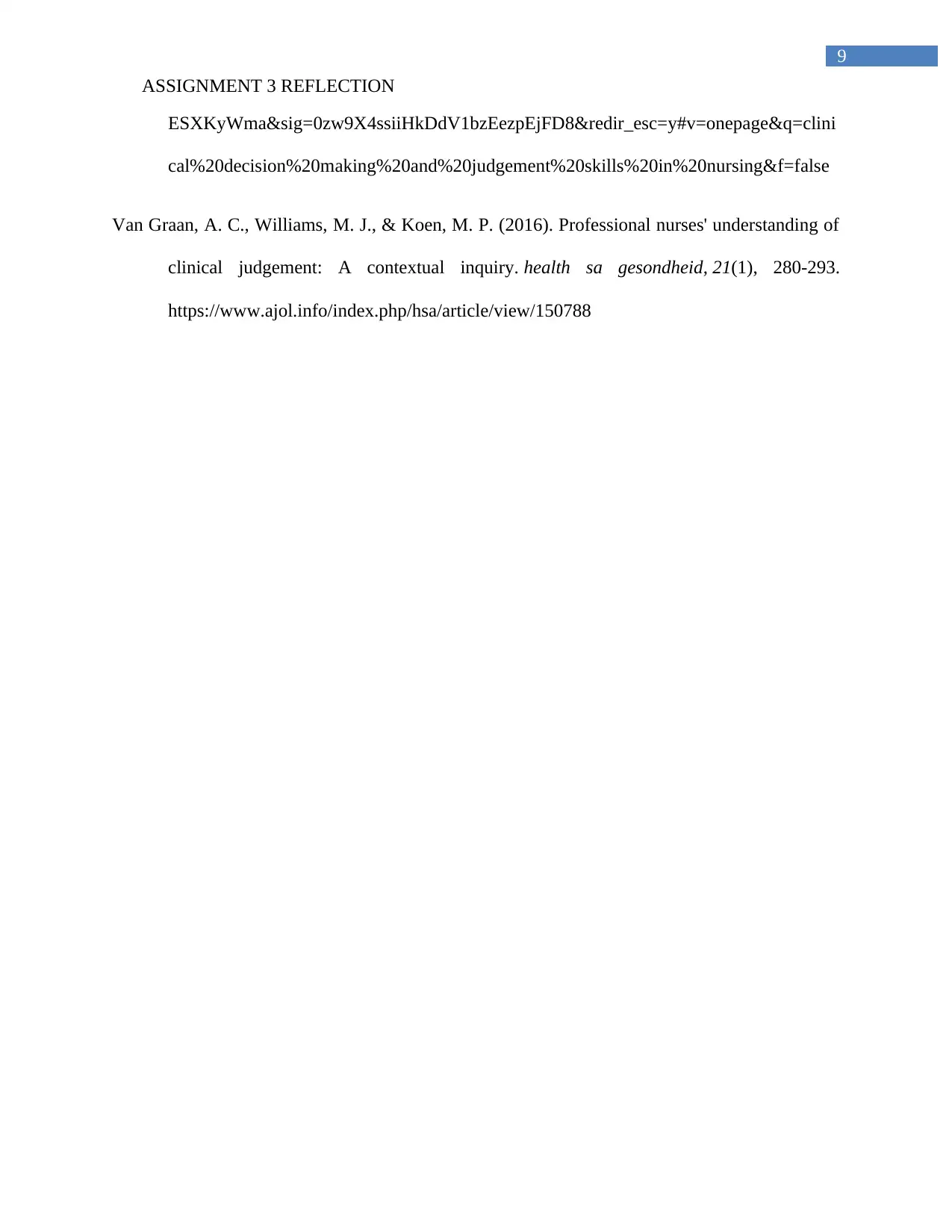
9
ASSIGNMENT 3 REFLECTION
ESXKyWma&sig=0zw9X4ssiiHkDdV1bzEezpEjFD8&redir_esc=y#v=onepage&q=clini
cal%20decision%20making%20and%20judgement%20skills%20in%20nursing&f=false
Van Graan, A. C., Williams, M. J., & Koen, M. P. (2016). Professional nurses' understanding of
clinical judgement: A contextual inquiry. health sa gesondheid, 21(1), 280-293.
https://www.ajol.info/index.php/hsa/article/view/150788
ASSIGNMENT 3 REFLECTION
ESXKyWma&sig=0zw9X4ssiiHkDdV1bzEezpEjFD8&redir_esc=y#v=onepage&q=clini
cal%20decision%20making%20and%20judgement%20skills%20in%20nursing&f=false
Van Graan, A. C., Williams, M. J., & Koen, M. P. (2016). Professional nurses' understanding of
clinical judgement: A contextual inquiry. health sa gesondheid, 21(1), 280-293.
https://www.ajol.info/index.php/hsa/article/view/150788
1 out of 10
Related Documents
Your All-in-One AI-Powered Toolkit for Academic Success.
+13062052269
info@desklib.com
Available 24*7 on WhatsApp / Email
![[object Object]](/_next/static/media/star-bottom.7253800d.svg)
Unlock your academic potential
Copyright © 2020–2026 A2Z Services. All Rights Reserved. Developed and managed by ZUCOL.





